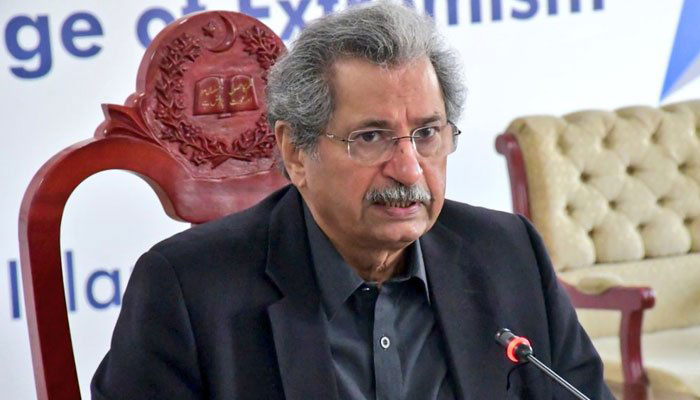Online conference discusses need for single national curriculum
The Corporate Pakistan Group and the Nutshell Conferences Group organised an online conference to discuss the need and importance of a single national curriculum.
In its introductory session, Federal Education Minister Shafqat Mehmood talked about the misunderstandings being generated about the single national curriculum introduced by the federal government.
He said it was the first time in the history of Pakistan that a single national curriculum had been introduced and it was a hard task that may have many problems and hurdles. States always want to set a minimum standard of quality education, but, unfortunately, during the 74 years of our country, education has been ignored, but in the charter of the PTI it has been given a top priority, he said.
According to the education minister, the purpose of the single national curriculum is to design a method of learning initially from classes I to V and then VI to VIII. Later, a curriculum for IX and X classes will also be prepared.
He clarified that they were not going to replace any system of education, whether it is O level or A level or Madaris, all could be continued. School may print/select their own syllabus, but at least the standard of teaching and learning should be fixed, he said.
Replying to criticism of the single syllabus, he said people thought there would be one book for all children in Pakistan, but it was not necessary. “We have designed model textbooks, but it is not obligatory for schools to follow them. Schools can select their own syllabus by taking an NOC.”
The education minister further said schools were allowed to teach subjects of their own choice like music, and Madaris can add Dars-e-Nizami to it.
English, Science and Mathematics will be taught in the English language, while the remaining subjects will be taught in Urdu. To teach English in pre-schooling, teachers have to learn English as well, and teachers’ training programmes are also designed to train teachers, and that may have difficulties as well.
The conventional assessment system of taking examinations based on textbooks was not sufficient to analyse learning outcomes of students, Mehmood said, adding that the assessment system for the national curriculum is under process.
He said Punjab, KPK, Balochistan, Gilgit-Baltistan and Azad Kashmir had accepted the national curriculum, but Sindh had objections to the Sociology subject. Objections were very minor and could be resolved, but they could be accepted on a political basis, he stressed.
Director National Curriculum Council Mariam Chughtai said that many people were interested to be a part of curriculum development, and any suggestion from teachers, parents and students would be appreciated.
The new syllabus from KG to grade XII will be introduced within six months, uploaded on the website and feedback will be generated. Previous syllabuses were compiled by educationists of the Punjab province only, but this time participation had been given to all the provinces.
A very flexible and impartial syllabus of Islamiyat has been prepared with the consensus of religious scholars of all schools of thought. People who are complaining about the shortage of books must be informed that several recommended publishers’ books are available on the website.
Dr Mariam Chughtai further said that the government was in collaboration with Google UK and other institutes to launch an online teachers’ training programme. She said that unfortunately Urdu had been considered less important and criticised.
If private schools start teaching the Chinese language in their schools, which would help to get corporate employment in future, no one would criticise, but they should know that the mother tongue had a vital role in the process of learning, she remarked.
The conference was also addressed by the director of Bloomfield School, Shazia Asmat Zaidi; head of the ACCA Pakistan, Sajeed Aslam; founder of the Rural Development Foundation, Gul Mariam; chief executive of the NBP Fund, Dr Amjad Waheed; chairperson of the Beaconhouse National University, Nasreen Mehmood Qasoori; founder of the Next Generation Professional Development, Shagufta Jabeen; the managing director of the Oxford University Press, Arshad Saeed Hussain; CEO Roots Millennium Education Choudary Faisal Mushtaque; and Talib S. Karim. They discussed prose and corn and reservations regarding the national curriculum openly.
-
 Why Ariana Grande Wants A 'tiny Mouse' To Play Her In Biopic?
Why Ariana Grande Wants A 'tiny Mouse' To Play Her In Biopic? -
 Wind Chill Returns With Brutal Cold As Polar Vortex Stalls Over Canada
Wind Chill Returns With Brutal Cold As Polar Vortex Stalls Over Canada -
 Costco $20 Rule Explained As Employee Pay Climbs Across North America
Costco $20 Rule Explained As Employee Pay Climbs Across North America -
 Strange Incident Happened At Nancy Guthrie's Home On Abduction's 10th Day
Strange Incident Happened At Nancy Guthrie's Home On Abduction's 10th Day -
 Tumbler Ridge School Lockdown Underway As RCMP Investigate School Shooting
Tumbler Ridge School Lockdown Underway As RCMP Investigate School Shooting -
 Britney Spears Quietly Parts Ways With Her Music Catalog: Report
Britney Spears Quietly Parts Ways With Her Music Catalog: Report -
 Princess Diana Bodyguard Suspected ‘she Could Die’: Here’s How
Princess Diana Bodyguard Suspected ‘she Could Die’: Here’s How -
 Teddi Mellencamp Marks Huge Milestone With Emotional Message Amid Cancer
Teddi Mellencamp Marks Huge Milestone With Emotional Message Amid Cancer -
 King Charles Makes It ‘absolutely Clear’ He Wants To Solve Royal Crisis
King Charles Makes It ‘absolutely Clear’ He Wants To Solve Royal Crisis -
 Kylie Jenner Looks Back With 'grace' On Early Fame Years: 'Just Being Myself'
Kylie Jenner Looks Back With 'grace' On Early Fame Years: 'Just Being Myself' -
 Royal Family Warned To ‘have Answers’ Amid Weak Standing
Royal Family Warned To ‘have Answers’ Amid Weak Standing -
 Marc Anthony On Why Bad Bunny’s Super Bowl Show Mattered
Marc Anthony On Why Bad Bunny’s Super Bowl Show Mattered -
 Kid Rock Gets Honest About Bad Bunny’s Performance At Super Bowl
Kid Rock Gets Honest About Bad Bunny’s Performance At Super Bowl -
 Kylie Jenner Reveals Real Story Behind Her 'The Moment' Casting
Kylie Jenner Reveals Real Story Behind Her 'The Moment' Casting -
 Jaafar Jackson Breaks Silence On Becoming Michael Jackson
Jaafar Jackson Breaks Silence On Becoming Michael Jackson -
 Eva Mendes Admits She Was Jealous Of Ryan Gosling’s CGI ‘girlfriend’ Rocky
Eva Mendes Admits She Was Jealous Of Ryan Gosling’s CGI ‘girlfriend’ Rocky




